- Home
- Jane Arbor
Wildfire Quest Page 2
Wildfire Quest Read online
Page 2
Absurd to feel hurt by that. Futile to wonder what about her had changed so much that he had no need to wonder whether perhaps he had ever seen her before. The styling of her hair, of course. Then she had kept it short and waved; now it was shoulder-length and merely curving at the tips. Her clothes too. That night she had worn a dirndl-skirted gipsy of a dress; today she was in oatmeal-coloured coarsely-woven linen, its line simple, its length in fashion. But her hair was still the same gold-brown, wasn’t it? The nose from which he had taken her nonsense of a mask; the mouth he had kissed; her profile— All these were still there for remembering, weren’t they ? And even though she had only just removed her sunglasses in order to see him the more clearly, surely, if he had noted anything about face, figure or eyes that he had liked, he might at least be wondering now.
But no, there was nothing in his stare, and his cool survey of her was matched by his formal ‘Good afternoon. Anything I can do for you, madame?’—his tone seeming to imply that whatever he could do for her would be a slight condescension on his part.
Disconcerted, she faltered, ‘No. I—that is, I found the gates unfastened and I—er—came in.’
‘For what purpose? The house is empty, as you can see from the road.’
‘Yes, I know. For—no purpose, really.’
A nod. The eyebrow quirked. ‘For no purpose,’ he echoed. ‘Just a little trespass for trespass’ sake— h’m?’ No annoyance in his tone. Just coolness which, from him to her, quite illogically, she minded more.
She admitted, ‘You could call it that, I suppose. But as I knew it was empty and as it is a house I’ve always admired, I thought—’
He broke in on that. ‘You’ve always admired it? Then you know it? But you’re a foreigner, aren’t you? English, at a guess? I’ve never seen you in Peyrolle, have I?’
(Haven’t you?) Aloud Maryan said, ‘Yes, English. I meant that I’d admired the place when I was here once before, some years ago. It was occupied by the Leduc family then, of course—’
‘Exactly. We—that is, all that was left of us, my sister and I, only vacated it about a year back. But I own it still—’ At Maryan’s little start he added, ‘I’m Raoul Leduc, of course. You wouldn’t know. And you—?’
Raoul Leduc! The owner of the ranging Leduc timber lands, now for some years the owner of the Plantage Feu-Follet; Peyrolle his home town, when that night-partner of hers in the mad carnival fandango might just as well have been a Frenchman from Marseille, or Paris or wherever? This region of dune and swamp, lagoon and forest, the wild Landes of south-western France—his country as it had once been her father’s! This was chance at its most freakish; chance having its way with her. It wasn’t fair. She pulled herself together. ‘I’m Maryan Vaile,’ she told him. ‘I’m staying at the Lion d’Or in the village.’
‘Alone? On holiday?’
‘I’m alone, but not on holiday. I shall probably be in Peyrolle for some weeks, though not at the Lion d’Or after today.’
This time both eyebrows lifted. ‘Covering your tracks from inquisitive males? What’s wrong with the Lion d’Or for a longer stay?’
‘Nothing. But when I booked, the proprietress evidently hadn’t realised that I’d want a single room and that I wasn’t the “passing trade” which she prefers.’
He laughed shortly. ‘Huh, we know our Madame Bresque! She likes her sous gold-covered. But if you want to stay on, leave her to me. I’ll deal with her.’
(As for lord of the manor, telling humble vassals where they get off? thought Maryan.) A shade distantly she said, ‘Thank you, monsieur, but it doesn’t matter. I’ll find somewhere else. In fact, I’m on my way to see about it now.’
‘In Peyrolle?’
‘If possible.’
‘Why?’
‘Because I like it, and it makes a good centre for what I’ve come to do.’
‘And what have you come to do that is going to occupy some weeks?’
Was this the point at which to snub the relentless inquisition and take her leave? Maryan did neither. She told him, ‘I’m on an assignment from my job. My chief in England is a professor who is contributing the European folklore section to a new encyclopaedia, and I’m doing the preliminary researches in this region for him. He has other people elsewhere in France, Spain, Italy and so on, and then he will collate and sift the lot.’
‘The lot—of what nature? And why you—here? Because of your excellent French?’
‘Partly, I hope. And because I know something of the district; my father came from the region. He was born at Lunfeve, but had been in England for many years until he died there a few months ago.’
‘I am sorry. Lunfeve? Vaile, you said?’ Raoul Leduc pondered the name as if he expected to identify its connection with an obscure up-country village. He shook his head. ‘No. However, to repeat—what kind of stuff are you looking for, and how do you set about finding it?’
‘Well, such folklore as I can hear, and traditions, and the regional dress and songs and any carnival goings-on that have survived, the old dances—’
‘Then you’ve come to the right place. Show any good Landais the date of a fete-day on the calendar and he’ll drop even his pelota-bat to foot it in a Bigue-Biguette or a fandango.’
Almost pleadingly Maryan met his eye, saw nothing there that she wanted to see. She said quietly, ‘Yes, that’s what I hope. I—once, when I was here before, joined in a street fandango, and it was fun.’
‘It can be—given an attractive enough partner.’
‘In the one I danced, we didn’t keep the same partner for long.’
‘No, one doesn’t. All the more important then for a man to assert himself with the pretty ones while he can.’
‘Yes, I suppose so.’ Maryan retreated from dangerous, barren ground by adding, ‘I’m hoping to research a good deal of what I’m looking for in the Basque Museum in Bayonne. Meanwhile, monsieur—’
He had switched off his engine, but set it purring again. ‘You want to be on your way? You have seen enough, have you, of my property?’
She flushed. ‘I’ve already apologised for that!’
He shrugged. ‘An innocent enough question. I merely meant that if you hadn’t, I would willingly show you the rest. Did you penetrate as far as the Pavilion, for instance?’
‘The Pavilion?’
‘The small dower-house in the gardens. After my mother died and I vacated the main building to take an apartment in Bayonne, my sister Lois chose to move into the Pavilion where she lives alone. If you could spare the time to meet her, she might be able to help you, perhaps. Will you come?’
Tempted, Maryan hesitated only a moment. ‘Thank you. I’d like to.’ As she took the passenger seat of the car, she asked, ‘How do you think Mademoiselle Leduc might help me?’
‘When I tell her what you are after, I’ll let her explain—if she cares to. If she doesn’t, there’ll be no great harm done, and perhaps I should warn you that she may not.’
This sounded less than promising, and Maryan’s expectancy chilled a little.
The ornamental gardens were beyond the end of the house other than that she had skirted. Raoul Leduc parked the car in a courtyard surrounded by stabling and led the way under a thick stone archway into the gardens proper. The Pavilion stood off a main grassed pathway, among trees. It was reed-thatched, circular, not much bigger than a lodge-cottage or a park shelter. It had only one floor, its small windows peering from directly under the eaves. It had no garden of its own; from its boundary hedge of lavender clipped low, a crazy path led to its door, which Maryan’s companion opened after a perfunctory knock.
By contrast with the sunlight, the living-room on to which the door gave directly was very dark; at first too dark for a fair judgment of the depressing effect it had on Maryan. It was not that it was untidy—lived-in, well-loved rooms frequently were, she knew. But this flotsam, these empty vases—in high summer!—this dust on good furniture, that unwashed coffee cup and saucer see
med to say that no one cared very much as to what impression it made upon incomers.
The woman who came forward out of the shadows at Raoul’s call of ‘Lois!’ could have been anything between five and fifteen years older than he. She was in a smock and jeans; her hair straggled from the confines of a chignon; her features were strong, aquiline; her best asset, the dark velvet eyes which looked a question at Maryan from beneath heavy, untended brows.
Raoul introduced Maryan—‘Someone I’d like you to meet. Mademoiselle Maryan Vaile. English, though she speaks French like one of us. Based on Peyrolle. I brought her to you, because you could do something for her, if you would.’
Lois Leduc offered a limp hand to Maryan. ‘Mademoiselle—’ she acknowledged her, and turned back to Raoul. ‘What then should I be able to do for her, you suppose? And why me?’
‘You if anyone, I think. She is researching our Landais customs as part of her job. So tell her, won’t you, that you are a near-professional on the guitar and a walking authority on Basque and Landais music that might be forgotten, but for virtuosos like you?’
Maryan, listening, looked eagerly into Lois Leduc’s dead-pan face. ‘Really, mademoiselle? Are you? And would you, perhaps— ?’ Her smile faded out as the other shook her head.
‘Me, I do not play any more. I take no interest in these things now,’ Lois said flatly. ‘You must look elsewhere, I am afraid. I cannot help you, and my brother had no right to lead you to expect I could. I am sorry. No.’
At that Raoul’s sharp exclamation of annoyance was almost an expletive, Maryan thought. He followed it up with, ‘This nonsense!’ in an explosive note. To which his sister replied stonily, ‘What nonsense?’
While Maryan stood awkwardly, sensing the undertow of hostility between them, and debating how she could gracefully make her escape. Raoul came to her aid. He shrugged. ‘And so—impasse. A pity. Ah well. Presently, if I may, I’ll drop you at the Lion d’Or on my way back to Bayonne, mademoiselle.’ He turned to address his sister again. ‘By the way, my sponsorship of Mademoiselle is not my chief errand today. In fact, I came over to tell you that I have let the house.’
He might have dropped a live bomb at his sister’s feet.
‘You have let it?’ she echoed. ‘To whom?’
‘To Ninon Barbe.’
‘To—that woman? Why?’
‘To that woman. Because she needs a pied-a-terre in the region while she looks into some business affairs, and she’ll probably entertain. Because she is willing to pay the rent I’m asking, and because the place has stood empty quite long enough.’
‘It needn’t be empty a day longer, if you knew your duty to the Domaine by occupying it yourself.’
Raoul’s eyes snapped. ‘Do I neglect the Domaine, just because I choose not to live in the house? We’ve been over all this before. I’ll return to the house if and when I acquire a wife to play hostess in it. In the meantime, I happen to prefer the amenities of my garconniere, do you mind?’
‘And of course one can guess why you prefer a bachelor flat,’ his sister retorted. ‘Tchah! Plans to entertain, indeed!—and her husband in his grave barely six months!’
‘More like nine, I think,’ Raoul corrected. ‘And he was, after all, nearer three times her age than twice.’
‘As she knew very well when she married him—for what she stood to gain when he did die. The profits of one of the biggest porcelain factories in Limoges, no less! However, since you’ve seen fit to rent her the house without consulting me, when does she move in?’
‘It could be any day now. She will let me know.’
‘She will let you know!’ Lois Leduc nodded, gritting her teeth. ‘You, not me, who has to suffer her on my very doorstep, while you retreat to Bayonne!’
‘I’ll see that you’re notified too,’ Raoul promised. Watching him in some embarrassment, Maryan saw the corner of his mouth lift in a half smile. ‘As you say, I retreat to Bayonne—if I can fight a path through the press of eager males heading this way at the news of Ninon’s setting up a salon in the Domaine!’ he added.
It was, Maryan realised, his effort to lighten a tension to which they shouldn’t have made her a witness, but when it evoked no answering glimmer from his sister, she felt less embarrassed for herself than sorry for them both. So close in relationship; yet so divorced in sympathy that one of them couldn’t time a joke better than Raoul had, and the other couldn’t take it in the spirit in which it was meant. It happened in families, of course. But Maryan found herself wishing she hadn’t been there to see an instance of it happening to them. (To two people who were nothing to her, nor were likely to be in the future—why should she care?)
She was relieved when Raoul gave her his attention again and suggested that they leave. On the short drive back to the village he did not mention the altercation, and when he drew up at the inn he asked what plans she had for finding other rooms.
‘I’d thought of consulting the board outside the Tabac Julien,’ she told him.
‘No need for that. I can recommend some.’ His pen at the ready, he thought for a minute, then wrote three addresses on a card and gave it to her. ‘Try those, mentioning my name,’ he said.
‘Thank you very much. I will.’
‘Think nothing of it. Personal service a Leduc speciality. If you get suited at one of them, I’ll call for my commission later.’
‘Do,’ she smiled. It was banter that she didn’t want to end, and though it had to, he did not let her go at once when he gave her his hand on letting her out of the car.
‘I’m sorry that Lois should choose to be so stonewall. But I did warn you. And’—he paused to smile in a way she remembered from a years-ago summer night—‘at least she didn’t forget her manners so far as to ask me in front of you where I had picked you up!’
Maryan turned scarlet and wrenched her hand free of his. ‘That’s not fair of you,’ she accused him. ‘Your sister wouldn’t have done that! People don’t—’ At the shame which washed over her, Maryan broke off. ‘Anyway, why should she?’ she finished in a lame, small voice.
The car was on the move now. As it gathered speed—‘A good question. Why? Well now, suppose you try to guess?’ Raoul threw back at her over his shoulder; laughing aloud, spoiling the smile, treading on dreams, telling her what Lois Leduc’s experience of him must know only too well—that she was only one of a crowd of girls at whom he had looked, laughed with a little, kissed and then dismissed before he moved on.
And she, poor fool, had let herself believe that, if they ever chanced to meet again, he would have remembered her!
CHAPTER TWO
The next morning Maryan woke to a vague sense of depression; its cause, she realised as she became more alert, her failure to find lodgings into which to move from the Lion d’Or. When Raoul Leduc had dropped her at the inn, she had not gone straight out in search of another room. But when she had done so later in the evening, she had drawn blank at each of the addresses he had given her.
They were all village houses, offering pension terms, and at each of them her first question as to whether they took guests for periods had been answered by a Yes. But when, encouraged, she had introduced herself, explained what she was looking for and mentioned ‘Monsieur Leduc’, then mysteriously each Madame had discovered she had no vacancies to offer.
Next week, possibly. Last week certainly. But today, regrettably nothing, helas. Even the one of the three which had a Vacancy card in its window had the effrontery to claim that the card was an understandable oversight, the room in question having been taken only five minutes or so before Maryan’s call! And so much for the lord of the manor’s name as an Open Sesame of influence! Why, its very mention had proved as good as a slammed door, thought Maryan as she had torn up his card and set out under her own steam in search of somewhere else. With only doubtful success, however, and she would be expected to vacate her room at the Lion d’Or by midday.
She rose, dressed, asked for her bill with her
cafe complet and stayed in her room, packing her things. Opening her handbag in order to tidy it, she saw there the tatters of Raoul’s card and emptied them with deliberation into the wastepaper basket.
An incident closed. Yesterday was yesterday and by today’s sober light had to be forgotten. Since she had to go about Peyrolle and he had too, the chances were that they would meet again some time. But never again would she know the sweet shock of that meeting at the gates of his house, nor suffer the leap of hope which had died at once.
Maryan Vaile. Raoul Leduc. Two people facing different ways now. And in place of his smile she would do better to ponder both his sister’s ‘And one can guess why you prefer a bachelor flat’ and the prim rejection by three landladies of a strange girl claiming his sponsorship. Judged by people who knew him for what he was. Even judged, she remembered, by kindly Maitre Druot for something unspoken. A lightweight, a playboy, and proud of it—(‘Suppose you guess?) So why, why on earth had she wasted her dreams?
The bedside telephone rang. Guillaume, the barman-porter, on the line. ‘A visitor for you, Mademoiselle Vaile. Monsieur Leduc, wishing to know if you were still with us.’
(Again, so soon?) ‘As I am,’ Maryan said. ‘What does Monsieur Leduc want?’
‘To enquire, he says. He will wait for you in the bar.’
“Very well, I’ll come down,’ she agreed. But she deliberately finished her packing and finally vacated her room before she did so.
The remembered smile was there for her, as was his handshake of greeting. He took charge of the light dustcoat she carried over her arm, showed her to a table in an L of the main bar, and brought the drink she chose and his own.
‘And so, what success did you have yesterday?’ he asked.
‘None at all, I’m afraid, with the addresses you gave me,’ she told him, not without a small perverse satisfaction that apparently, patron-wise, he wasn’t quite the genie he thought himself.

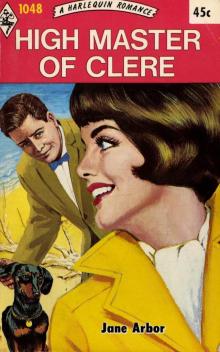 High Master of Clere
High Master of Clere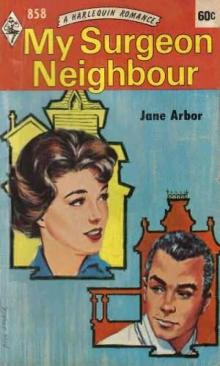 My Surgeon Neighbour
My Surgeon Neighbour Lake of Shadows
Lake of Shadows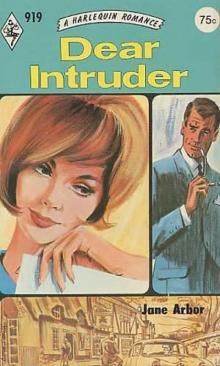 Dear Intruder
Dear Intruder Flash of Emerald
Flash of Emerald Return to Silbersee
Return to Silbersee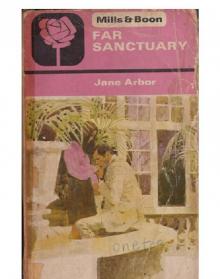 Far Sanctuary
Far Sanctuary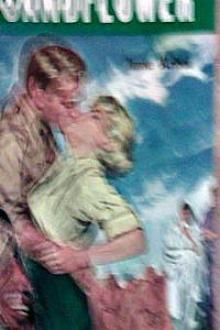 Sandflower
Sandflower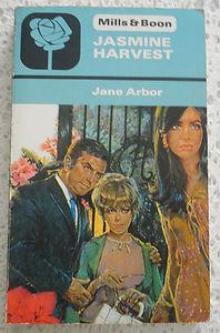 Jasmine Harvest
Jasmine Harvest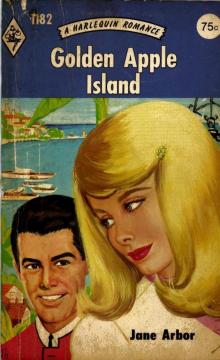 Golden Apple Island
Golden Apple Island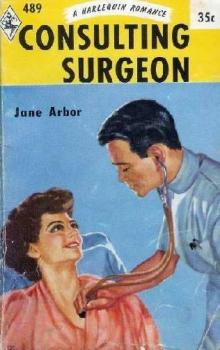 Consulting Surgeon
Consulting Surgeon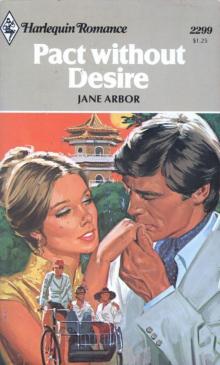 Pact without desire
Pact without desire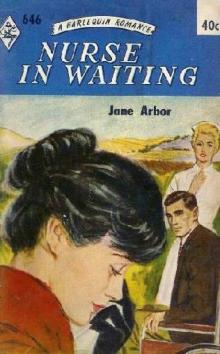 Nurse in Waiting
Nurse in Waiting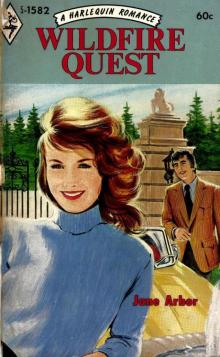 Wildfire Quest
Wildfire Quest Roman Summer
Roman Summer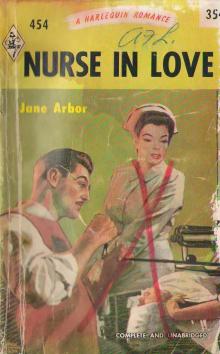 Nurse in Love
Nurse in Love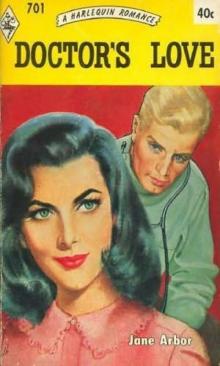 Doctor's Love
Doctor's Love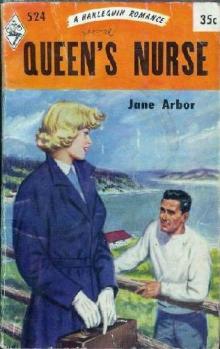 Queen's Nurse
Queen's Nurse Meet the Sun Halfway
Meet the Sun Halfway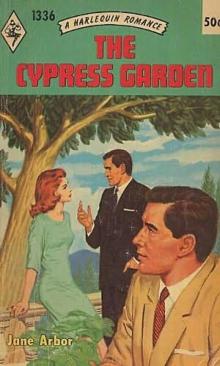 The Cypress Garden
The Cypress Garden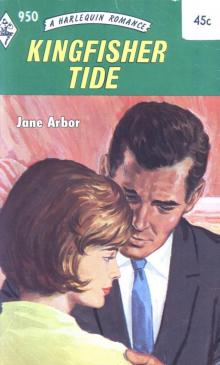 Kingfisher Tide
Kingfisher Tide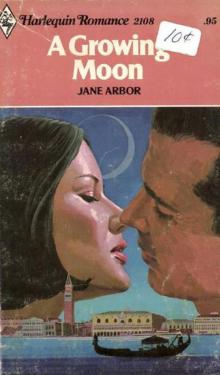 A Growing Moon
A Growing Moon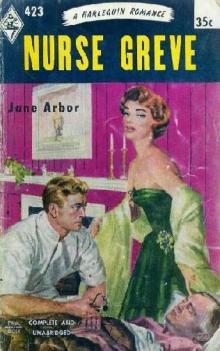 Nurse Greve
Nurse Greve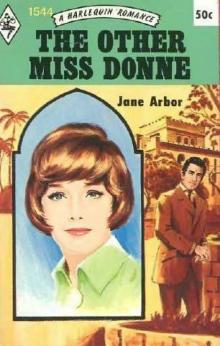 The Other Miss Donne
The Other Miss Donne